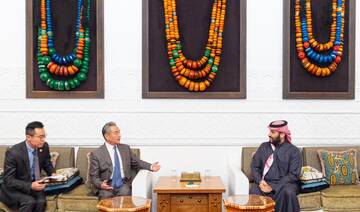RIYADH: Award-winning Canadian comedian Russell Peters has revealed the secret behind his successful career.
“Identify your dream and actively chase it,” Peters said during a recent interview on Arab News’ podcast, The Mayman Show. “It’s far more rewarding to have pursued your dream, even if you fail, than to passively wonder about it.”
Peters found his own path in 1989 when he began performing stand-up comedy at amateur shows. Despite not being allotted more than five minutes with the mic, he was determined to pursue his passion.
“If I got one laugh, I think that’s all I needed: Let’s figure this out, let’s try to figure out how to get more of those people,” he said on learning from his first performances.
Discussing his early career, he talked about being booed off stage in Toronto in 1993 while opening for The Pharcyde, a hip-hop group from the US. With hindsight, he laughs at his own arrogance then, viewing the experience as a well-deserved lesson.
Peters recounted how he would drive hours to perform, earning $50 plus complimentary chicken wings, a tank of gas, and a soda. During those days, he thought: “If I stayed, I’d be in the exact same financial position I would have been had I gone. So I wasn’t losing anything and I’d stay there and I’d be talking to people for free,” he said. “I just remember all the hard gigs, those were the fun ones.”
Fast-forward to 2024, and Peters has been hailed as one of the greatest comedians of all time by Rolling Stone, and has held the record for being the longest-standing comedian since 2007. He was also the first comedian to sell out Toronto’s Air Canada Center in 2007, and has performed in Vancouver’s Rogers Arena, London’s O2 Arena, and more. As part of his “Act Your Age” tour, which he has been doing since 2021, Peters recently took to the stage in Riyadh, performing at the Princess Nourah bint Abdulrahman University on Feb. 24.
This is his third visit to the Kingdom, and Peters admires the generosity of the Saudi people: “I remember at the hotel, they said, how did you sleep? And I said, it was honestly like the best, the most comfortable bed I’d ever felt in my life, and when I came back to my hotel room, they had packed up all the stuff that I complimented and shipped it to me in America.”
Peters also cherishes the memory of his performance at the Maraya building in AlUla in 2016, renowned as the world’s largest mirrored concert venue. “The acoustics are great in there because it’s built for that. And they put the sound dampeners in there. The same can’t be said for when I just performed in Egypt,” he said.
During his one-night performance in the country, American comedian Adam Hunter opened his show. Hunter is known for his popular Instagram channel, MMA Roasted, in which he humorously critiques fighters, and has been traveling with Peters for some time.
His latest show in the current tour is scheduled for March 3 in Bangalore, India, a place he regards as his true home. Beyond the stage, Peters also feels at home in the DJ booth. He said that his DJ career was purely for enjoyment, focusing mostly on old-school music. Peters said that his go-to song is “Black Trump” by Smif-N-Wessun and Raekwon.
Peters is currently practicing jujitsu, a form of martial art. His enduring passion for combat disciplines began at the age of 16 with boxing, because of bullying at school. Boxing became more than just a sport; it was a coping mechanism, especially after he was kicked out of school.
Later on, as his career developed in comedy, it also became a way of dealing with challenges.
“I would do it all the time growing up,” Peters said, “to try and get out of situations, dealt with a lot of racism growing up. So you just kind of figure out a way of getting out of situations by being funny.”
















